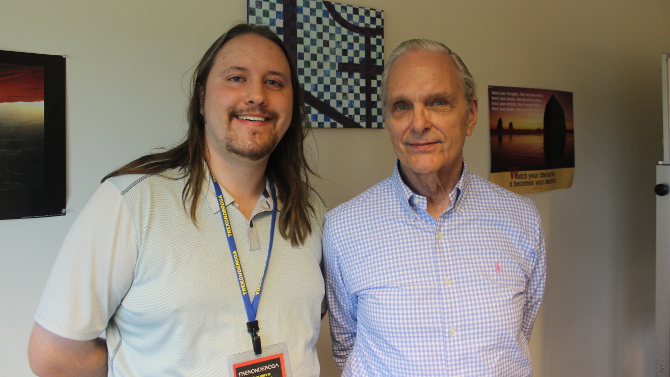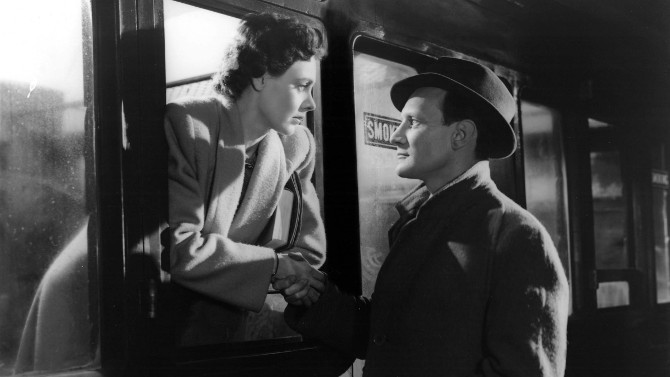Whilst attending Trekonderoga, the Ticonderoga comic convention that is all things Star Trek, on August 13th, 2016, I was fortunate enough to be able to interview Keir Dullea. Best known for taking on the starring role of Dr. Dave Bowman in Stanley Kubrick’s iconic space epic 2001: A Space Odyssey – he reprised the character for the film’s 1984 sequel 2010: The Year We Made Contact. Dullea has played a variety of intriguing roles over his six plus decades in the industry, getting his first lead role in 1962’s David and Lisa, the actor then went on to star in 1964’s The Thin Red Line, Otto Preminger’s 1965 mystery Bunny Lake is Missing, 1974’s Black Christmas (often considered to be the genesis of the slasher horror film genre), and Robert De Niro’s 2006 flick The Good Shepherd, to name but a few of his film credits. The man actually highlighted a small Canadian film that he made back in 1973, titled Paperback Hero (also known as Last of the Big Guns), as being the favourite film he has worked on to this point.
Though perhaps better known as a film star, he has made quite a splash on the stage as well. Participating in a number of Broadway plays (1969’s Butterflies Are Free and 1975’s P.S. Your Cat is Dead!), Dullea has continuously returned to the theatre throughout his career. Back in 1974, he played Brick in Tennessee Williams’ iconic Cat on a Hot Tin Roof, while more recently (2013), he took on the role of Big Daddy opposite his wife Mia Dillon for the Wellfleet Harbor Actors Theater/Provincetown Tennessee Williams Theater Festival version of the same play.
Eventually, the conversation turned to his favourite film. Unable to choose one, Dullea highlighted two memorable motion pictures as being at the top of his list. The first is the 1945 Noël Coward produced, David Lean directed British film Brief Encounter (which will be reviewed here), while the second is the powerful Stanley Kubrick war picture Paths of Glory. Feel free to check out my review of that movie here: http://filmizon.com/movie_reviews/war-what-is-it-good-for/ Also, please check out the video interview down below to hear the stage and screen icon discuss his illustrious career.
David Lean’s fourth film (with such glorious epics as Great Expectations, Oliver Twist, The Bridge on the River Kwai, Lawrence of Arabia, and Doctor Zhivago still to come) takes us inside the world of a plain, ordinary married woman named Laura Jesson (Celia Johnson). Lean immediately throws us into a meeting she is having at a train station with a charming doctor named Alec Harvey (Trevor Howard). Your astute eyes should immediately realize that there is something more to this conversation. They are soon interrupted by an acquaintance of Laura’s, yet the look on their faces, as well as the way in which Alec squeezes her shoulder just prior to his departure, are telling.
Laura then returns home to her husband Fred (Cyril Raymond) and their two children, clearly frazzled and seemingly drained of life. The couple have, what would be termed, a comfortable marriage. Fred, a man who spends more time lost in his own head (as he ponders the answers to crossword clues) than in the real world, is perhaps not the most attentive husband. Laura, clearly contemplative, falls into a sort of fugue state as she imagines how she should tell the story of what has been going on to her staid husband.
By way of narrated flashbacks/recollections, Laura transports us to her first chance meeting with the doctor. The housewife, who does all of the family’s shopping each Thursday by way of train to Milford, just happens to get a piece of debris in her eye while in the station. In steps a doctor, Harvey, who gallantly removes the piece of grit from her cornea.
In another semblance of chance, the two bump into each other at a drugstore. In what now seems like fate (in a third meeting), the pair are forced to share a table at a packed restaurant as there is only one seat remaining in the entire establishment.
Soon, the couple are spending cozy afternoons together; laughing, enjoying the dark intimacy of a movie theatre and spoiling themselves with lunches or dinners. The two seemingly happy married individuals very quickly realize that they are beginning to fall for each other. They glow and act silly as only those in the first stages of love do, yet their carefree attitudes are quickly dampened by the worry and fear that accompany their taboo activities. Each ‘date’ forces them further and further down the rabbit hole, as they not only become more intertwined, but also take the chance of being spotted by one of their many respective friends. Soon, they are lying to cover up their tracks.
The two struggle to deal with the complex set of emotions. The powerful warmth of the love and joy that they are feeling is uplifting, yet they are also chained to the guilt that they feel for betraying their respective significant others. Alec soon decides that he is going to take a job in South Africa, saving them from their impossible predicament. As the finale approaches, we are met with the opening scene of the film once again, which is much more relevant and poignant now that we know the back story. Will they choose to break convention and stay unified in their infidelity, or will Alec depart for Africa, making sure that they never see each other again in order to save their honourable images and marriages?
Featuring a simple narrative that is unfurled in the perfect way, David Lean concocts a romantic drama for the ages. Utilizing the opening scene of the film twice, Lean leads us to it once again by way of flashbacks, finding the opportune manner in which to achieve maximum impact for the forbidden love story. Yet, all of this would be for not if it weren’t for the stunning performances from the two leads (Johnson and Howard) – as it is easy to buy into the couples’ romantic escapades. We, the audience, can see the ennui that has crept into their quaint, middle-class lives, and their relationship is all the more authentic due to the magical twinkle and charming warmth that envelops them when they are together (more than enjoying their time outside their sedate marriages).
Echoing this sentiment, the selection of Sergei Rachmaninoff’s “Piano Concerto No. 2” adds gravitas to the picture, as the tune features both the beauty and melancholic sadness that the pair are feeling while participating in their complicated tryst. It is an emotional piece of music that is pure perfection for this piece of art.
I would also like to quickly mention the secondary roles played by Joyce Carey and Stanley Holloway. Carey portrays Myrtle Bagot, the lady who is in charge of the tiny refreshment shop at the train station, while Holloway takes on the role of Albert Godby, a station conductor at the crossing. Their interesting banter and his flirty ways (which she rebuffs, but clearly likes) adds a nice little side story to the script.
There is something about Brief Encounter that sticks with you. It doesn’t have impressive action sequences or a volatile villain, but the paired down story of two people in love dealing with the moral quandary of being married to other people is profoundly potent. The subject is handled with such careful grace by both Lean (providing us with beautiful camera work) and the actors, making for a tale that feels utterly real. It seems fitting that much of the motion picture takes place at a train station, as there is something both romantic and fleeting about the locomotive. So, let your engines steam up and watch this beautiful piece of cinema, you won’t be disappointed that you took the journey.


